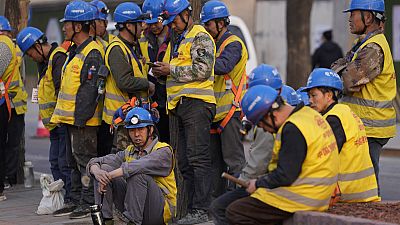China
China's economy surged ahead in the first quarter of the year, exceeding expectations set by analysts.
The government announced Tuesday that the world's second-largest economy grew at a rate of 5.3% annually from January to March, surpassing the forecasted 4.8%. Compared to the previous quarter, the economy expanded by 1.6%.
This growth comes as a relief amid the challenges posed by the COVID-19 pandemic, which had slowed demand and sparked a property crisis. The latest figures, however, paint a brighter picture, with industrial output up by 6.1% and retail sales increasing by 4.7% compared to the same period last year. Fixed investment in factories and equipment also saw a growth of 4.5%.
Analysts attribute the robust growth to a combination of government policies aimed at stimulating the economy, increased consumer spending during the Lunar New Year holidays, and a boost in investments.
However, concerns linger over potential weaknesses in March's economic indicators, particularly in post-holiday activity. Additionally, external demand remains uncertain, highlighted by a notable underperformance in March's exports.
Loo noted that an unwinding of excess inventory, normalization of household spending after the holidays and a cautious approach to government spending and other stimulus will affect growth in this quarter.
Policymakers have unveiled a raft of fiscal and monetary policy measures as Beijing seeks to boost the economy. China has set an ambitious gross domestic product (GDP) growth target of about 5% for 2024.
Such strong growth usually would push share prices across the region higher. But on Tuesday, Asian shares fell sharply after stocks retreated on Wall Street.
The Shanghai Composite index lost 1.4% and the Hang Seng in Hong Kong lost 1.9%. The benchmark for the smaller market in Shenzhen, in southern China, lost 2.8%.
Stronger growth in the region's biggest economy normally would be seen as a positive for its neighbors, which increasingly rely on demand from China to power their own economies.














01:40
Kenya cancels airport and energy deals with Adani group after the U.S. indicts the tycoon
Go to video
Fugitive Zambian MP Emmanuel Jay Banda arrested in Zimbabwe after three-month Manhunt
Go to video
Spain to offer residency and work permits to undocumented migrants
Go to video
Archbishop of Canterbury will end official duties in early January amid sex abuse scandal
Go to video
Congo opposition leaders call for protests against president's plan to change constitution
Go to video
At least 7 members of Nigerian security force missing after insurgents ambush convoy